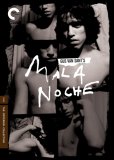| Reviews & Columns |
|
Reviews DVD TV on DVD Blu-ray 4K UHD International DVDs In Theaters Reviews by Studio Video Games Features Collector Series DVDs Easter Egg Database Interviews DVD Talk Radio Feature Articles Columns Anime Talk DVD Savant Horror DVDs The M.O.D. Squad Art House HD Talk Silent DVD
|
DVD Talk Forum |
|
|
| Resources |
|
DVD Price Search Customer Service #'s RCE Info Links |
|
Columns
|
|
|
Mala Noche - Criterion Collection
THE MOVIE:
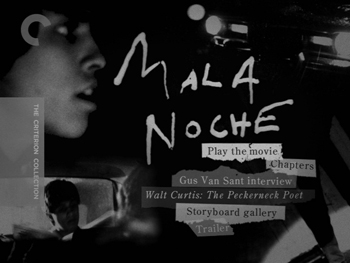
Living in Portland, Oregon, everyone has a Gus Van Sant story. Mine is pretty mundane. I saw him once at a New Year's Day hangover party. He was standing off to the side with some friends, quiet. I never spoke to him or got introduced to him, a fact my host lamented when it came up later. No big deal. This is Portland. I'm sure I'll have the chance again.
Van Sant has made his home in Portland for many years, and quite a few of his movies are not just love letters to the city, but snapshots of periods of time, a preservation of the streets we all walk. Just as much as we have Gus Van Sant stories, we can point out what was once the pharmacy robbed in Drugstore Cowboy and street corners the hustlers prowled in My Own Private Idaho. We're also good at giving tours showing the street names that Matt Groening lifted for Simpsons characters. That's just how we do.
Mala Noche, Van Sant's first movie, started this trend. Dating back to 1985 (though first shown in 1987), it's a little harder to spot familiar landmarks since a lot of them are now gone, but I'm pretty sure I used to live a couple of blocks from the car dealership that Walt (Tim Streeter) first propositions Johnny (Doug Cooeyate) outside of. If I'm right, they sell Jaguars now; if I'm wrong, we'll still say I'm right and categorize it as the personal appropriation of local lore.
In addition to being a snapshot of mid-'80s Portland, Mala Noche is also an important freeze frame of an intersection of queer and independent cinema. Post-Jim Jarmusch, pre-Todd Haynes, it's the kind of landmark that changes what is possible, that gives new filmmakers permission to go further out on a limb. In style, it owes a little bit to Jarmusch (specifically Stranger Than Paradise), but Haynes probably took a little bit from Mala Noche when it came time to make Poison. The lineage is complete.
Up until now, though, Mala Noche (which translates as "Bad Night") has not been available on home video, much less DVD. A video store I used to work at had a couple of ancient VHS copies that they believed Van Sant made himself, but I never stepped down to watch it in that format, because surely such an important and distinctive film was going to get put out on DVD by somebody. Thanks to the folks at the Criterion Collection, someone now has.
So, how does the Mala Noche - Criterion Collection hold up? Pretty good as it turns out. Based on an autobiographical story by maverick writer Walt Curtis, the film follows the struggling author on his quest to connect with Johnny, the pretty illegal alien who rode a train to Puddletown from Mexico and who is far cagier than his silence would suggest. Johnny keeps Walt at arm's length, even when money is offered, sticking around for the things he can get from the desperate store clerk and playing at street games that skirt the edges of danger. The closest that Walt ever gets to sleeping with Johnny is Robert, a.k.a. Pepper (Ray Monge), the even quieter sidekick. Over the course of a couple of weeks, the boys move in and out of Walt's life, twist him in knots, and also get more trouble than they bargained for.
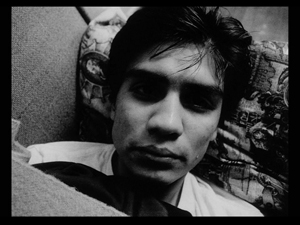
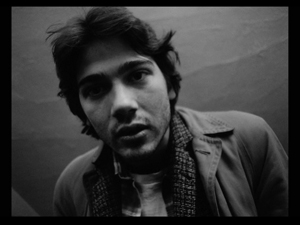
Van Sant and cameraman John Campbell, who also lensed Idaho and Even Cowgirls Get the Blues, shot the movie in jittery black-and-white. Though the choice may have been more budgetary than stylistic, they keep everything cramped, emphasizing the intimacy as well as the trapped feeling that a life on the streets can bring. They relish in details, chopping close-ups into scenes, showing the constant flow of commerce, both monetary and personal (the sex scenes are shot the same way). The whole movie is edited with the twitchy rhythm that evokes life in the city, following the cadence of Curtis' Beat-inspired writing, which is preserved in voiceover by Streeter. It's a tricky mish-mash of not much happening and seeming like the activity never stops. There is always something to do, it's just that something may end up being a whole lot of nothing.
Mala Noche isn't a perfect film. The Walt character is a little hard to like, always on the make, though eventually it stops feeling like he's taking advantage of the young boys and it's clear they are really controlling him. That tightrope that Van Sant walks in trying to show urban ennui also ends up making the film seem choppy. The narrative's internal sense of time is confused, and some of the heavier scenes don't come across with the full weight they demand, resulting in Mala Noche ultimately feeling a tad inconsequential.
Still, Van Sant's visual style is already emerging, and his freewheeling tone is probably at its freshest thanks to the first-time director's naïveté. As with so many watershed moments in art, it's what follows the barrier being broken down that is usually the more enduring material, but that doesn't devalue the pioneers. If nothing else, Mala Noche captures the feeling of a particular time out on the fringes, both for queer males and for filmmakers trying to smash the system. It's got that fire of youthful rebellion, and regardless of how far from Van Sant's starting point we travel, that first spark will always be there.
THE DVD
Video:
Given that Gus Van Sant has held on to Mala Noche for all these years, he must have had some pretty good source materials for Criterion to work from, because this new fullscreen transfer (1.33:1 aspect ratio) is pristine. The black-and-white photography is crisp, keeping all of the light and dark values of the original composition.
As with most of the Criterion full frame discs of late, this one is also pictureboxed, meaning on widescreen monitors you will see black bars on all four sides.
Sound:
The original soundtrack is mixed in a clean mono set-up, without any extraneous noise or distortion. The Spanish dialogue is subtitled in English, with the translation burned into the picture in the style of the original release.
Extras:
Mala Noche - Criterion Collection has several extras focusing on Gus Van Sant and the making of the movie, including a storyboard gallery, the original trailer that Van Sant edited himself, and a new interview with the director. The interview lasts 25 minutes, and in it Van Sant tells about coming to Oregon, meeting Walt Curtis, the locations the movie touches on, and the history of the movie. It is decorated with many vintage photos.
The most substantial extra is the documentary Walt Curtis: The Peckerneck Poet. Made by animator Bill Plympton (another Oregon native), this 64-minute 1995 film shows Curtis leading the filmmakers around, talking about his life, showing off his paintings, and performing his poetry. He's quite the character, and Plympton just lets him go for the most part, but he also shows the planning and thought the writer puts into what he is going to do. The most spontaneous seeming art, you'll find, is often the most strategized.
Mala Noche - Criterion Collection is packaged in a clear-plastic case with double-sided cover. A 12-page interior booklet is artfully designed with photos and an essay by film historian Dennis Lim.
FINAL THOUGHTS:
Recommended. The long overdue release of Mala Noche - Criterion Collection finally brings the cult touchstone to DVD. Gus Van Sant's first film, released back in 1985, was a groundbreaking work that kicked off the queer cinema revolution in independent motion pictures. Based on the work of Walt Curtis, it tells the story of a somewhat predatory man's pursuit of a young Mexican boy he's attracted to and the complications that entails. Though in some ways the film shows its age, it still manages to convey the feeling of what it was like to live on the streets at the time, to be an outsider looking for some kind of inside status among fellow outsiders. Mala Noche's youthful exuberance may have lead to some amateur mistakes, but it's an exuberance that is so difficult to capture any other way, you have to forgive it for its faults and just let it be.
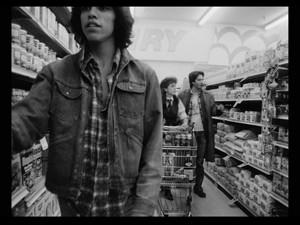
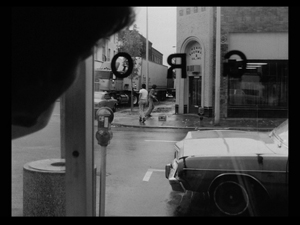
Jamie S. Rich is a novelist and comic book writer. He is best known for his collaborations with Joelle Jones, including the hardboiled crime comic book You Have Killed Me, the challenging romance 12 Reasons Why I Love Her, and the 2007 prose novel Have You Seen the Horizon Lately?, for which Jones did the cover. All three were published by Oni Press. His most recent projects include the futuristic romance A Boy and a Girl with Natalie Nourigat; Archer Coe and the Thousand Natural Shocks, a loopy crime tale drawn by Dan Christensen; and the horror miniseries Madame Frankenstein, a collaboration with Megan Levens. Follow Rich's blog at Confessions123.com.
|
| Popular Reviews |
| Sponsored Links |
|
|
| Sponsored Links |
|
|
| Release List | Reviews | Shop | Newsletter | Forum | DVD Giveaways | Blu-Ray | Advertise |
|
Copyright 2024 DVDTalk.com All Rights Reserved. Legal Info, Privacy Policy, Terms of Use,
Manage Preferences,
Your Privacy Choices | |||||||









